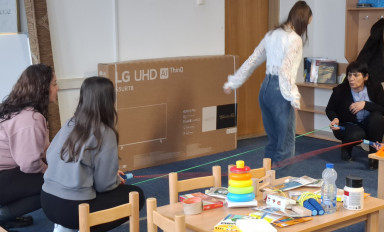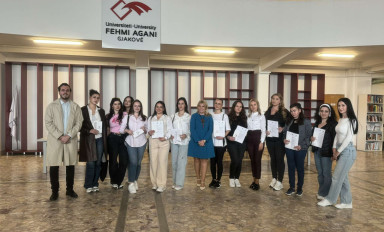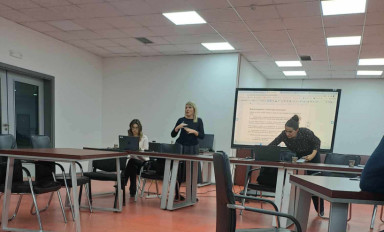Primary Education Program
The Primary Education Program aims to prepare students to meet the demands of contemporary teaching and learning processes, fostering their development into effective educators. Through the use of methods that encourage analysis, information evaluation, and problem-solving, while creating an environment that promotes reflection and discussion, the program enables students to cultivate critical and innovative thinking skills.
Through the implementation of information technologies and contemporary teaching methods, as well as the use of technological tools and platforms, the program provides opportunities for the creation of interactive and personalized learning environments. The Primary Education Program aims to develop students' abilities to act ethically and professionally in educational settings, fostering an inclusive and equitable approach to education for all. Additionally, it equips students with knowledge of curriculum structure and content, as well as the skills to conduct research projects that analyze educational practices, thereby contributing to the advancement of the education system.
An important aspect of this program is the continuous professional development of students and collaboration with families and the community to create an environment that supports children’s development and enhances the quality of education. These efforts will contribute to the creation of an education system that is prepared to address the challenges of the future in society.
The objectives of the study program are:
- Implements the basic principles of the Kosovo education system in the design and implementation of the learning process in the primary cycle;
- Analyzes knowledge on learning theories to build effective teaching practices in primary education;
- Adapts the learning process to different developmental levels, learning styles and individual needs of students to ensure differentiated learning;
- Develops professional responsibilities in accordance with the role of the teacher in the school and with educational policies;
- Implements inclusive teaching methods that ensure equal participation for all students;
- Designs and implements lesson plans in accordance with the curriculum philosophy and functionally integrates interdisciplinary content;
- Adapts different assessment strategies to measure student progress in achieving certain competencies;
- Integrates technology into the learning process to encourage active learning and independent inquiry in students;
- Implements reflective practices to assess teaching effectiveness and collaborates with colleagues for continuous professional development;
- Uses research methods to reflect and improve the quality of the learning process in a sustainable manner;
- Integrates contemporary pedagogical practices and approaches in line with innovations in education and student needs;
The learning outcomes for the study program are:
- Understand the system of principles that pre-university education in Kosovo aims to develop, and can integrate these principles into the teaching process.
- Explain the main concepts and theories of student learning and education, and analyze their connection to classroom teaching practices.
- Recognize the cognitive, emotional, and social development of children, understanding it as a process closely influenced by environmental factors.
- Understand how the educational system functions and the role of the teacher within the school, educational policies, and national standards for quality in education.
- Develop and implement teaching activities that place the student at the center of the process, considering the challenges and complexity of the school reality.
- Design, implement, and assess the teaching process in accordance with the curriculum philosophy and its respective fields, including interdisciplinary integration.
- Plan and deliver inclusive teaching, ensuring equal opportunities for participation and progress for all students.
- Use various forms of assessment, such as formative and summative, adapting them to competency-based evaluation.
- Use digital technology to support learning in different subjects, as well as promote the responsible use of technology for researching information from reliable sources.
- Develop reflective and collaborative practices focused on professional growth, regularly evaluating the impact of teaching through reflection, collaboration with colleagues, and participation in training programs and various educational conferences.
- Prepare and apply research projects aimed at analyzing specific phenomena in education and teaching.
- Create activities that encourage the full development of students' potential and their ability to analyze, interpret, and use information for specific purposes.
- Apply critical and scientific thinking skills through engagement in research work aimed at the continuous improvement of teaching practices.
- Create learning activities adapted to different learning styles, ensuring differentiated instruction for all students.
- Implement effectively innovations and contemporary educational practices based on students’ individual needs and developments in the field of education.

 Library
Library 


.png)
